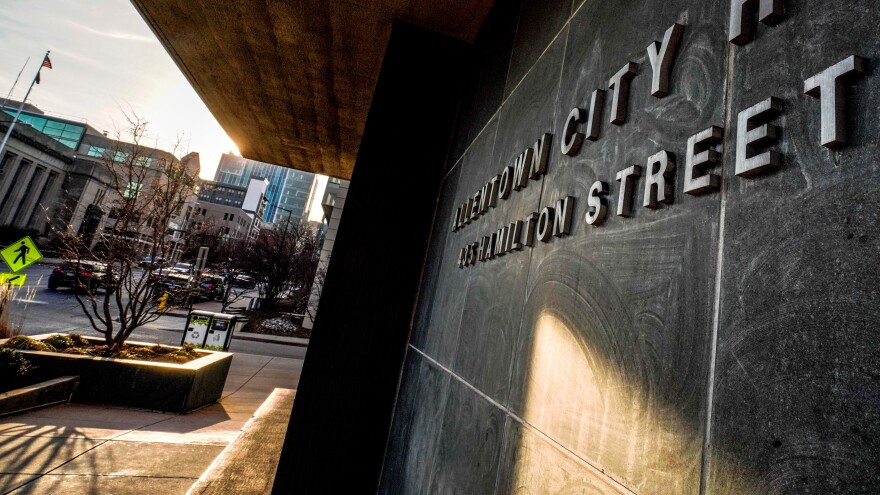ALLENTOWN, Pa. – Allentown City Council voted Wednesday to approve Mayor Matt Tuerk’s request to appropriate $10,000 for an analysis of the embattled Allentown Parking Authority.
The approval means the city will hire an independent consultant to provide a legal and policy analysis of the APA. It comes in response to hundreds of residents who have become angered over what they consider overbearing and predatory practices in the issuing of parking tickets and citations.
- Allentown City Council approved funding Wednesday for an analysis of the parking authority
- The approval means the city will hire an independent consultant to provide a legal and policy analysis of the APA
- Other cities are getting creative in the way they're addressing parking woes, from pilot programs to valet services and smart parking options
“I appreciate the work the parking authority is doing to improve things,” Tuerk said at the meeting. “But I want the public to understand this is not an indictment of the parking authority (workers) just doing their jobs on the street.
“We’re going to do an analysis and come to a conclusion. We’ll be very public with this.”
The parking authority will hold a special board of directors meeting at noon Thursday to review parking regulations and a public parking forum at 5 p.m. Tuesday at The Americus Hotel.
But Allentown is far from the only city to experience a mismatch between the supply of and demand for parking — and all the issues it's caused with ticketing and towing.
Here's what other cities are doing to try to solve parking woes:
In Reading, a pilot program made permanent
Reading City Council heard the results last summer of a comprehensive parking study presented by Desman Design Management. Out of that came a recommendation to make it easier for residents of row homes with rear alley access to install parking pads in their backyards.
It came months after the city approved a pilot program that would allow the Reading Parking Authority to paint defined parking spaces on 31 city blocks.
"This was from numerous complaints from residents that people have been taking up two spaces with one car," Nathan Matz, executive director of the parking authority, said at a council meeting. “And when someone else comes home, they'll back up and will then basically be reserving a space for someone else."
Matz cited an engineering study that found that there were a total of 980 spaces in those 31 blocks. By striping defined 8-foot-by-20-foot spaces, Matz said the city would gain an additional 107 spaces.
In October, the city made the stall program permanent in the pilot program area and said future areas would need to be approved by ordinance.
In Illinois, a valet program
The city of Lockport, Illinois, looked to solve some of its parking woes as quickly as possible without causing headaches with residents and business owners. The solution: a valet program.
The program, according to StrongTowns.org, was first proposed in 2020 but delayed due to the pandemic. But in March 2021, Lockport approved a $75,000 contract with VIP Valet Services to operate Friday, Saturday and Sunday in the late afternoon and evenings. (Sunday hours have since been discontinued).
City officials said the complimentary valet program immediately improved the flow of traffic downtown, eliminating congestion caused by cars cruising around city blocks looking for a parking space.
In Virginia, smart parking
In Arlington, Virginia,there’s a way to track real-time parking spot availability using sensors and a video detection system. The sensors detect the presence of cars, reporting on the availability of each parking space and sending that information to a wayfinding app.
The goal of the eXactpark system is to help drivers quickly and efficiently find available on-street parking, reducing cruising and congestion and improving overall safety in the area and helping to lower greenhouse gas emissions.
The software also integrates with parking meters and helps the parking management team to gain a better understanding of parking usage.
The entire system is set to go live this summer after first being installed in a courthouse parking lot for testing.
In Columbus, a turn to public transit
In 2016, the City of Columbus, Ohio, won the U.S. Department of Transportation’s Smart City Challenge, which came with $50 million in grants. While those grant initiatives were just the start, the city outlined one big initiative: to solve mobility issues.
Tucked inside a 75-page proposal was a plan for a city-issued all-access transit pass, along withkiosks to check transit schedules, see bike availability at bike share stations, or call a ride share service.
Instead of getting in cars, more residents would be taking the bus rapid transit line – which, thanks to a network of sensors that would detect and prioritize transit vehicles, would see all green lights as it cruised through the city.
The goal isn’t just about alleviating parking issues, but taking advantage of a wealth of 21st century technologies to help make parking woes a thing of the past.


